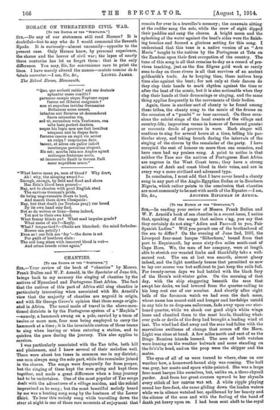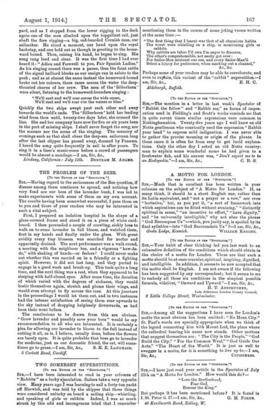[To TRH EDrfOR OF TEE "SPECTATOR.")
SIR,—In reading your review of Messrs. Frank Bullen and W. F. Arnold's book of sea chanties in a recent issue, I notice that, speaking of the songs that sailors s'ng, you say that they certainly do not sing " Adieu and Farewell to you, Fair Spanish Ladies." Will you permit one of the brotherhood of the sea to differ ? On the evening of June 2nd, 1897, the Liverpool four-mast barque 'Silberhorn,' bound from that port to Esquimault, lay some sixty-five miles south-east of Cape Horn. We, the men of her company, were at length able to stretch our wearied limbs and thankfully take a well- earned rest. The sea. at last was smooth, almost glassy indeed, and the light northerly breeze that permitted us now to lay our course was but sufficient to just keep the sails full. For twenty-seven days we had battled with the black fury of the Horn's mid-winter gales. On the morning of that day, with the ship staggering beneath the seas that swept her decks, we had lowered from the quarter-railing to his long rest one of our number. And shortly after eight bells of the forenoon watch we had seen the dark mass, whose name has meant cold and hunger and hardships untold in any tale to us deep-sea sailormen, fade away upon our star- board quarter, while we shook our good ship's white wings loose and chautied them to the mast heads, thanking what- ever gods or devils of the deep had brought a leading wind at last. The wind had died away and the seas had fallen with the marvellous swiftness of change that comes off the Horn. Light was close at hand. A few miles north and east of us the Diego Ramirez islands loomed. The men of both watches were leaning on the weather bulwark and some standing on the fo'c's'le head, and on the poop were the skipper and the mates.
The eyes of all of us were turned to where, close on our weather bow, a homeward-bound ship was coming. The bull was grey, her masts and spars white-painted. She was a large four-mast barque like ourselves, but, unlike us, a three-skysail yarder. And from her great courses upward to her skysails every stitch of her canvas was set. A white ripple playing round her fore-foot, she came gliding down the leaden waters while we in silence watched her, spellbound by her beauty and the silence of the seas and with the feeling of the hand of death yet heavy upon us. I had been sent aloft to the royal
yard, and as I stepped from the lower rigging to the deck again one of the men climbed upon the topgallant rail, just abaft the fore rigging—a big, red-bearded Cornish man, our sailmaker. He stood a moment, one hand upon the royal backstay, and one held out as though in greeting to the home- ward bound. Then, raising his hand, he began to sing. His song rang loud and clear. It was the first time I had ever heard it : "Adieu and Farewell to you, Fair Spanish Ladies." As his singing ceased there was a pause, then the faint rattle of the signal halliard blocks as our ensign ran in salute to the peak ; and as at almost the same instant the homeward-bound broke out her colours, there came across the water the deep- throated chorus of her crew. The men of the Silberhorn ' were silent, listening to the homeward-bounders singing : "We'll rant and we'll roar across the wide ocean, We'll rant and we'll roar o'er the waters so blue."
Quickly the two ships swept past each other and away towards the world's ends. The Silberhorn' held her leading wind from then until, twenty-two days later, she crossed the line. She and her company have now for five or six years been in the port of missing ships. I shall never forget the song, nor the manner nor the scene of the singing. The memory of evenings such as that shall cheer the deep-sea sailorman long after the last clipper has passed away, doomed by Panama. I heard the song quite frequently in sail in after years. To sing it in a liner's music-room before a crowd of passengers would be almost a sacrilege.—I am, Sir, &c., Lindsay, California : July 12th. BERTRAM M. ADAMS.



































 Previous page
Previous page